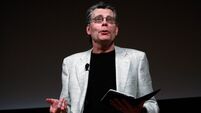McIlroy’s fallibility is what draws us to him

A teenage Rory McIlroy proudly displays the Irish Close Championship trophy which he won at Westport Golf Club in June 2005. Picture: Enda Lonergan
It was a historic week in Westport in more ways than one.
On Sunday, June 20, 2005, Westport United won the FAI Junior Cup down in Kilkenny, the only Mayo club to have ever done so and a success that will always bring a warm glow to anyone associated with the club.
But just three days earlier, Westport Golf Club was the scene for another piece of history that would magnify over the years and has come to the fore this past week. Westport hosted the prestigious Irish Close Championships where a teenage sensation became its youngest-ever winner.
There was excitable talk about Rory McIlroy, from Hollywood in Co Down, before the Irish Close. He didn’t disappoint, steering his way to victory over the best Irish amateurs, all with considerably more experience than him.
Watching McIlroy, who had just turned 16, tame the challenging course in Carrowholly that week was an eye-opening experience. He was a youngster in a hurry. Two years later he would turn pro and by 2011 he won his first major.
In Westport, his father Gerry carried his bag – literally, just that. Even though his father is a low handicap golfer and passionate about the game, by then he was of little help to his son in terms of advising on putts, clubs etc. McIlroy was in a different orbit.
His brilliance off the tee, on the fairways and on the few times he found himself in trouble was remarkable. His putting was the weakest part of his game. Much better than any of us mere mortals watching on, but for the company he was looking to keep, certainly an issue.
We watched him closely over the years. He was just 22 when he won the 2011 US Open (with the US Masters, US PGA and The Open, one of the four majors in professional golf). He didn’t just win it but he left everyone way behind to win by an incredible eight shots.
He was 23 when he won the PGA and 24 when he won The (British) Open in 2014 and was on a roll.
Since then, he has, by his incredibly high standards, foundered repeatedly in search of a fifth major and, more pertinently, the US Masters crown at Augusta to complete the iconic golf Grand Slam.
His talent was never in doubt nor was his application. McIlroy is one of the best-conditioned golf players you will see. But with every Major failure in those 11 years came increased pressure. He has been incredibly successful in regulation tournaments but, at the level McIlroy plays at, it is the Majors which define you.
He left a host of great opportunities behind him while the pressure at Augusta was most pronounced, because of the Grand Slam winning there offered and because of his experience in 2011. Aged just 21 then, he had a four-shot lead going into the final round but collapsed badly with an eight-over final round of 80.
He had the talent of Tiger Woods but not the same machine-like ability Woods had in racking up 14 majors in eleven years from 1997 to 2008 before scandal in his personal life drove his career off the rails. Before then, Woods appeared impenetrable to nerves or anxiety as he just blew away opponent after opponent mercilessly.
Anyone who has played golf at any level will know how frustrating it can be, how one day the ball will roll for you and the next day you are like a lumberjack, traipsing through the trees looking for errant balls.
Woods made an extremely difficult game look so easy. It was hard to relate to him as a consequence.
McIlroy’s fallibility was altogether more endearing. Perhaps we have a softer spot for him in Mayo as we can surely see echoes of our football team in him this last decade, coming so close but, with each failure, adding more and more scar tissue, making that finish line seem further away than ever. But never giving up.
The phrase ‘bottlers’ has been thrown flippantly at both Mayo and McIlroy and it can hurt. Personally, I think anyone who has the resilience to keep coming back for more and keep putting themselves in a position to get it done is the opposite of a bottler, demonstrating courage. But when you struggle when something is within touching distance, such barbs are inevitable.
And boy did Rory McIlroy struggle when his Grand Slam was within touching distance last week.
The final round at Augusta was a microcosm of all his setbacks over the years. It was like something scripted from Hollywood. We got to see his mesmerising brilliance followed by his very human failings, something all of us average Joes and Janes can empathise with.
None of us can hit a golf ball like Rory McIlroy but anyone who has played sport at any level can relate to the effects of pressure on our ability to execute what should be straightforward skills.
What separated McIlroy at the Masters was his ability to rise after every fall when most of us would collapse.
McIlroy took a two-shot lead into the final round. He double-bogeyed the first hole to wipe out that bonus and everyone thought, ‘Here we go again’.
But he steadied himself and by the turn, he was four clear. He hit what looked like a shot of a lifetime on the seventh. Many thought that might be the moment he turned the screw but no.
On the 13th he hit another double bogey. Only one person has ever won the Masters after hitting three double bogeys across the four rounds. McIlroy hit four over the week. Sums him up.
The 13th looked like it could be fatal. He played conservatively and had a short pitch to the green but hit it into Rae’s Creek. Meanwhile Justin Rose was on the march, cutting into the lead.
McIlroy bogeyed the next but then another shot of a lifetime on the 15th appeared to hand him an eagle. He had to settle for birdie but an incredible birdie on the 17th set him up. A par on the last hole and the Masters, the Grand Slam, was his. Agonisingly, he hit his second shot into a greenside bunker and though he rescued well, he missed the par putt.
It looked like he had blown it. Mentally, he must have been shot to pieces. Lose this one and it could define him forever.
That’s where Rory McIlroy is different from the rest of us. He let his game take over in the play-off. A great drive set up a brilliant second shot which he pitched to three feet and when Justin Rose missed his birdie putt, McIlroy had deliverance within his sight. He didn’t falter until the ball sunk into the hole and he collapsed to the ground, a blubbering mess.
Where’s the fun in doing it the easy way?





